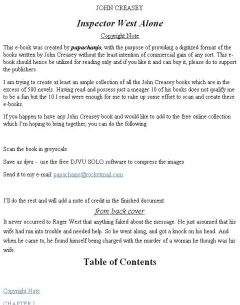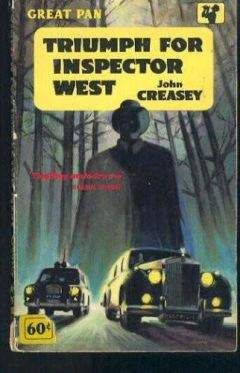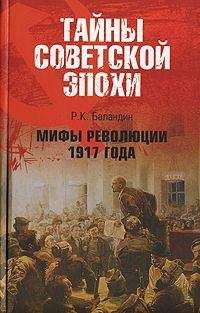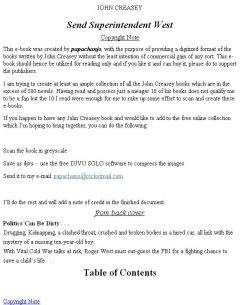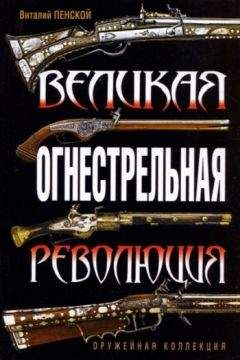John Creasey - Inspector West At Home
As he waited on the kerb while the taxi turned in the road, footsteps, soft and stealthy, drew near him. He took it for granted that this was the plainclothes man and took no notice. The taxi pulled up and the driver expressed himself tersely on the weather.
“You going far ?”
“Scotland Yard,” said Roger. The shadowy figure behind him drew nearer and he wondered what the man was thinking. As he was climbing into the cab, the figure moved forward and a soft voice, certainly not belonging to the detective, broke the stillness.
“Excuse me, sir.”
Roger turned his head, when half-in and half-out of the cab.
“Yes?” He was in no mood for casual encounters.
“I hope you won’t think this an impertinence,” said the stranger, “but I am most anxious to get to Piccadilly and the buses appear to have stopped running. I wonder if you would mind if I shared your cab?”
“What abaht askin’ me?” demanded the driver.
“Oh, yes, indeed — if your fare wouldn’t mind.” The man looked towards the cabby. Roger noticed that he wore a trilby hat pulled low and had his coat collar turned up. As he saw the pale blur of his face he thought, impatiently, that it could not have happened at a worse time, but he said:
“Of course,” and hoped that he sounded cordial.
There was no sign of anyone else nearby.
“Thank you so much,” said the stranger, eagerly.
“Op in,” said the driver.
Roger shifted to the far corner and the newcomer sat back with a sigh. He murmured that taxi-drivers were getting far too independent, it was most embarrassing to ask favours of them; it was very good indeed of Roger to allow him to share the taxi. Had he overheard him say that he was going to Scotland Yard ?
That was an invitation to confide, but Roger made an evasive remark and sat back. The other continued to talk of the weather, the cold war situation, the possibility of the bank rate going up, the price of houses and income tax. Roger made an occasional comment.
The cab drew up outside the gates of Scodand Yard, and the cabby opened the glass partition.
“Needn’t take you right in, need I ?”
“No, this will do fine,” said Roger.
He got out, stumbling over the other man’s outstretched legs. He paid off the driver and watched the rear light fading into the night. He heard the footsteps of the policeman on duty and, a moment later, a bull’s eye lantern was switched on.
“Is that necessary?”
“Oh — sorry, sir,” said the policeman, putting the light out hastily. “Nasty night, sir, isn’t it?”
“Bloody,” growled Roger and strode towards the steps. It was some consolation to know that the man had no instructions to stop him. He went up the steps and into the hall, where a sergeant on duty saluted. He was an oldish fellow with a wisp of yellow hair and very thin features. It might have been the light and shade of the hall, but to Roger he seemed surprised as he said “Good evening.”
“ ‘Evening, Bates,” grunted Roger.
He passed no one downstairs nor on the stairs, but the walls themselves seemed cold and hostile. He had never been in the Yard before without feeling a certain friendliness in its atmosphere. He began to realise how much the place meant to him. The dimly-lighted passages, shadowy now, seemed to hold a menace which was no less disturbing because its cause was unwarranted.
He opened the door of his office quickly and stepped inside.
Eddie Day was sitting at his desk with a watchmaker’s glass screwed to one of his prominent eyes. He looked up — and the glass dropped out, bounced from his desk and rolled along the floor.
Roger repressed a comment, loosened his coat and approached Day, looking down at the startled man.
“So you’ve heard, have you ?”
“H-h-heard w-w-what?” stammered Eddie.
“Why pretend that you haven’t, Eddie? Is it all round the Yard?”
Eddie closed his mouth, then bent down to retrieve the glass. His face was scarlet when he straightened up. Then he burst out:
“I’ve heard a rumour, yes!” To his credit he stopped pretending and did not try to make light of it. “You could have knocked me down with a feather. I don’t know what to make of it, I really don’t. You’re the last one I would have thought —” he broke off. “What are you doing here ? You’ve been suspended from duty, haven’t you?”
“I haven’t been told so.”
“Oh, well, perhaps that’s a rumour,” Eddie said hopefully. “I hope it is, Handsome. I can’t believe —” he paused and then went on : “Did Abbott have a search-warrant?”
“He did. And he used it.”
“Blimey!” Eddie pushed his lips forward and eyed Roger owlishly. “I just couldn’t believe it when I heard. When Bennett told me I thought he was joking, but he said he’d seen the warrant. What’s the Old Man got to say?”
Roger said : “The Assistant Commissioner hasn’t thought it worth discussing with me.”
“Strewth !” exclaimed Eddie.
“Eddie, do something for me,” said Roger softly. “If you know what they think I’ve been doing, if you’ve any idea from where they got the tip, tell me. I was pretty sharp with Abbott, because I know nothing about it. What do you know?”
“Handsome, I’m with you. I think it’s all a lot of nonsense. I can’t understand the Old Man. All I know is that you’re supposed to have accepted bribes over a period of the last three months.”
“From whom ?” Roger demanded.
“The squeak came from Joe Leech.”
“Oh,” said Roger. He stepped restlessly to the fireplace, where the fire glowed red. He knew ‘Joe Leech’, a bookmaker in the East End who kept within the law and was allowed to go to the extreme limits because he was a regular source of information to the police. His information was usually reliable and the police were often obliged to act on it. Few at the Yard had any liking for Leech, whose bad reputation in the East End was well known. Two or three times a year he had to be given police protection after he had squealed and friends of his victims had threatened violence. One thing was certain. Leech would not have done this unless he believed the allegation to be true or unless he had been heavily bribed.
“Don’t say I told you,” pleaded Eddie.
He heard someone approaching and put his glass hastily to his eye. The footsteps passed. Eddie stared at Roger with his glass at his eye, his forehead and nose wrinkled.
“It’s a bad do, Handsome, no doubt about that.”
He broke off when the telephone on his desk rang. He answered it and Roger judged, from his manner, that it was Chatworth. Eddie was more impressed by the Assistant Commissioner than most Chief Inspectors, although Chat- worth had a reputation for being a martinet.
Eddie replaced the receiver and stood up, gathering some papers from his untidy desk.
“Got to go and see the Old Man,” he said, in a confidential undertone. “He wants my report on those dud notes. You know the ones I mean.”
“Yes,” said Roger, with a flicker of interest. “Are they slush?” He thought of the £1,000 now at the Strand Post office waiting for ‘Mr North’ but it was too early to ask Eddie’s opinion of the two specimens; Eddie was not a man to be trusted in these circumstances. There were two Yard men who might take the risk of helping him, but one, Sloan, was on holiday.
“Stake my reputation on it,” said Eddie, half-way to the door. “They’re good, though. Er — best of luck, Handsome. If I can do anything let me know.”
Alone in the office, Roger looked about him, putting his hand in his raincoat pockets. He felt an envelope in there but thought nothing of it. The green-distempered walls displayed a few photographs, including one, old and faded, of a
Suffragette procession down Whitehall in 1913, two cricket XI’s one of them including himself, two or three maps of London districts and several calendars. On one of the desks was a small vase of fading daffodils. The fireplace was littered with cigarette ends and the carpet, with several threadbare patches, had a few trodden into it. The desks were bright yellow but, in places, the polish had worn off and the bare wood showed. There were little partitions for different papers – ‘For Attention’ – ‘For Review’ – ‘Mail In’. Suddenly he stopped reading the black, stencilled letters, for his own desk was empty; everything had been removed since he had been there that morning.
He turned away, taking his hand out of his pocket and drawing the envelope with it. He looked down at the crumpled paper, frowning. It was thick and newish-looking; had it been in his pocket for some time it would have been grubby. He remembered thinking that morning that it was a fortnight since he had last worn his raincoat. He had not noticed the envelope then.
It was sealed and there was no writing on it. He inserted a finger at one end and ripped it open. Inside was a single slip of paper on which were two or three lines of block letter writing, upside down. He turned it swiftly and read :
Dear West,
I’ve another proposition I think will interest you. It will pay even better than the last. Meet me at the usual place, tomorrow, Wednesday, at 7.30, will you?K.
At first startled, then tight-lipped, Roger re-read it. All that it meant and all it might have led to passed through his mind, together with a fact which he had to face and which almost stupefied him. ‘Another proposition’, inferring that there had been plenty of others; ‘It will pay even better’ . . .’ meet me at the usual place . . .’
A film of sweat broke out on his forehead.
To Abbott it would be just the evidence he wanted — and he had brought it into the Yard himself! He might easily have left his coat on a peg and gone to try to see Chatworth, which was his chief reason for coming. He stared down, studying the ‘K’ more closely; it was a carefully-formed letter; the whole note had been written by someone who knew how to use a pen. It was in drawing-ink, jet black and vivid against the white paper.
He screwed it up, with the envelope, turned, and placed it carefully in the middle of the glowing embers of the fire. It began to scorch but took a long time to blaze up. He heard someone approaching and turned with his back to the fire. As he did so the paper caught alight, making a flame bright enough to cast his shadow on the nearest desk. If someone came in and saw it they might try to retrieve the evidence.
The man outside passed, footsteps ringing on the cement floor. Roger stirred the blazing paper with his toe. In a few seconds it was just black ash, glowing red in places and giving off a few sparks which were quickly drawn up the chimney. He went to an easy chair to recover from the shock and to face the obvious fact; the envelope had been put in his pocket either at his own house or in the taxi.
CHAPTER 5
No Welcome for Roger
NO ONE came to the office.
Roger sat in an armchair of faded green hide. Nothing seemed quite real and the appearance of the note in his pocket seemed fantastic. He could remember every word and every characteristic of the lettering, the quality of the white paper and its thickness. He half wished he still had it, but it must have been too dangerous to keep.
Abbott must have searched the raincoat, so the note had not been there at five o’clock. No one had been in Bell Street except his friends and the police. The thought that Morgan might have put it there could be dismissed at once. The more he considered it the more convinced he was that the soft- voiced man of the taxi had inserted it when Roger had got out of the cab.
Roger stood up, and went to the door.
Chatworth’s office was on the next floor. Roger walked to the stairs and met two Detective Inspectors coming down. They looked surprised to see him. Along Chatworth’s corridor a door opened and Superintendent Bliss, broad and fat and with a voice like a dove, almost knocked into him.
“West!” he exclaimed.
“Bliss?” said Roger.
“Eh — didn’t expect to see you,” said Bliss and hurried off. Two men in the office stared at Roger as if at something strange. Tight-lipped, Roger went on to Chatworth’s office. There was a light under the door and he could hear Eddie Day’s sing-song voice. At the best of times it was unwise to interrupt Chatworth; he would have to wait.
Two corridors away was a common-room, for higher officials. It had a billiard table, table tennis, darts and all the paraphernalia of a club. Nearing the door Roger could hear the murmur of voices, and bursts of laughter. He went in and walked across the room without drawing attention to himself. Someone looked up from the billiard table and he heard his name uttered sotto voce. Two other men turned to stare. Others, by the walls playing chess and draughts, two card parties and table-tennis players, all stopped just long enough for the pause to register.
He felt the blood flooding his cheeks.
No one spoke to him and he made no attempt to start a conversation. Fair-haired, youthful Inspector Cornish, who had recently been promoted from one of the Divisions, was the nearest approach to a close friend Roger had at the Yard. He was the only one here who might risk helping him.
Cornish looked up from an evening paper, coloured and averted his eyes. Roger turned on his heel. He was by the door when he heard his name called and, looking over his shoulder, saw Cornish hurrying towards him, his fresh face alive with concern.
“Handsome, do you know what’s being said ?”
“And believed, apparently,” rejoined Roger.
“Is there any truth in it ?” Cornish demanded.
“You ought to know better than to ask,” Roger said. “It’s a canard and will be recognised as such one day. Then what will all my good friends say when they come begging Superintendent West for favours?” He looked contemptuously round the room and felt suddenly unaffected by the hostility and the strength of the feeling against him. He would have felt strongly towards anyone whom he believed to have committed a cardinal crime in a policeman’s calendar. They had no time or sympathy for a renegade. He went on, sounding almost light-hearted. “You’d better be careful, Corny, or you’ll be looked upon as an accessory ! Good night!”
He went out, hearing the hum of conversation which followed. The door opened again and Cornish hurried after him.
“Roger. Roger!” The other was distressed and Roger turned and waited. “Look here, old man,” said Cornish, “just answer me this — did you do it?”
“I did not.”
“Is there anything I can do?” asked Cornish abruptly.
